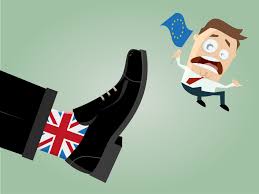 Putting aside the non-stop debate in the mainstream media driven by the sheer terror of the political establishment, government elites, and those with a vested interest in maintaining their positions as members of the status quo the real question we need to be asking in order to effectively plan for the future is; Does Brexit signal the beginning of the end of globalization and western capitalism? Consider the following:
Putting aside the non-stop debate in the mainstream media driven by the sheer terror of the political establishment, government elites, and those with a vested interest in maintaining their positions as members of the status quo the real question we need to be asking in order to effectively plan for the future is; Does Brexit signal the beginning of the end of globalization and western capitalism? Consider the following:
Globalization
Globalization benefits many businesses and economies, but it has hurt workers across the globe, including the working classes in the U.K. Canada and the United States. The lack of government action to help them has given rise to populist and protectionist sentiment, and those fueled Brexit.
World trade will always exist, but global free trade such as we have experienced since the end of World War II could be ending. The U.K.’s Brexit may be interpreted as the first major move toward protectionism, and it may be followed by U.S. protectionism depending on how the votes fall in November. A return to a pre-WWII era of currency and trade wars, and mercantilism or protectionism would stunt global GDP.
Western Capitalism
Capitalism is losing its luster right now.
Critics have emerged who are arguing that that Western Capitalism is the root cause of declining middle and lower income wages leading to populist movements and calls for greater protectionism.
Our take is that the critics are focusing on the wrong things. They should be reacting to two new problems that occurred over the last few years that have fundamentally changed Western Capitalism for the worst: free markets were not allowed to self-correct, and regulations reining in bad financial players that hurt whole economies were reversed.
The first problem has to do with central bank stimulus around the globe in the wake of the 2008 financial crisis. The stimulus stopped the onset of a second depression, and we’re all glad not to be standing in soup lines. But by continuing easy money and low interest rates (not to mention negative interest rates in some jurisdictions) the central banks have created a perverse situation where the governments have in essence, chosen winners and losers, and not let capitalism cull the herd of weak companies. This also created greater income inequality, and a drag on overall economic growth.
The other problem is the world’s financiers, businessmen and politicians who abandoned Depression Era regulations 20 years ago that protected the world economy from capitalism’s excesses, particularly in the world of finance.
The 2008 global financial crisis would not have happened if investment banks and commercial banks had stayed separate, investment banks had continued as partnerships, mortgages had continued to stay on bank balance sheets, and derivatives had been forced to trade on regulated exchanges. And that’s just to name a few.
Such regulations had served us well since the Great Depression and it was a mistake to get rid of them. We, in essence, have essentially created the same global Wild West economic and regulatory environment that existed during the early 1900’s that led the world into the depression of the 1930’s.
Not to digress too far down the path of pessimism we cannot lose sight of the fact that ultimately Western Capitalism is a force for good, and it will survive—as long as governments address the needs of those displaced and hurt by globalization. Also required are tougher regulations to level the playing field in open markets, and to punish companies that take risks that put us all in jeopardy. Above all what we need is a new generation of business and political leaders that focus more on the long-term than on the last quarter or election cycle.
So if governments take the right steps, we can make globalization and capitalism work for all of us. If they don’t, we’re facing a different, darker world.
As a collection agency with offices in Edmonton, Calgary and the GTA we are watching with keen interest the unfolding of events with respect to these phenomenon and their impact (or lack thereof) on Canadian credit markets.